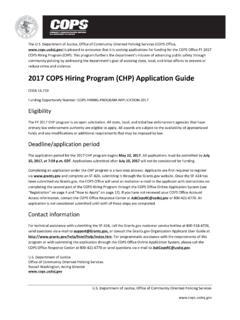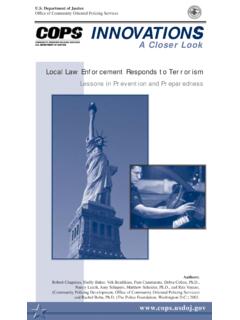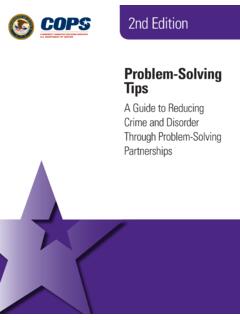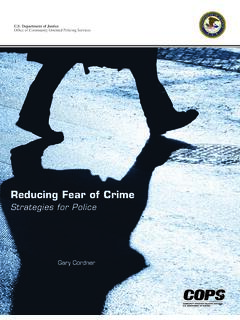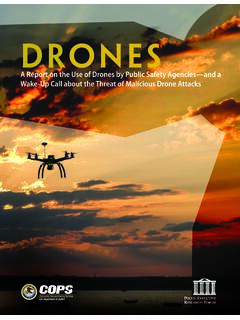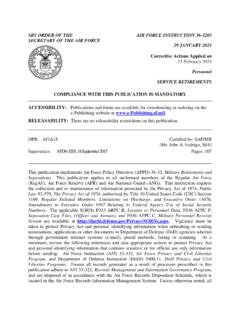Transcription of STANDARDS AND GUIDELINES FOR INTERNAL AFFAIRS
1 STANDARDS AND GUIDELINES FOR INTERNAL AFFAIRS : Recommendations from a Community of Department of JusticeOffice of Community Oriented Policing ServicesThis project was supported by Cooperative Agreement Number 2003-HS-WX-K040 awarded by the Office of Community Oriented Policing Services, Department of Justice. Opinions contained in this document are those of the authors and do not necessarily represent the official position or policies of the Department of Justice. References to specific agencies, companies, products, or services should not be considered an endorsement by the authors or the Department of Justice. Rather, the references are illustrations to supplement discussion of the document is the result of collaboration among several large law enforcement agencies. References to the INTERNAL AFFAIRS methods or approaches of specific agencies are included in the document as illustrative examples only and should not be considered an endorsement, recommendation, or favoring by the Department of further information concerning this report, contact:Los Angeles Police DepartmentCommanding Officer, Professional STANDARDS Bureau304 South Broadway, Suite 200 Los Angeles, CA and GUIDELINES for INTERNAL AFFAIRS .
2 Recommendations from a Community of PracticeContentsLetter from the Director 6 Acknowledgments 7 Introduction Intake What a complaint is and who may file one How a complaint can be transmitted and what forms it can take Receiving complaints at agency facilities Availability of complaint forms or other means of filing complaints Dissuading complainants Tracking complaints Complaint acknowledgments Auditing complaint intake Complaints and lawsuits Classification of Complaints Criminal complaints When criminal prosecution is declined INTERNAL administrative complaints Holding administrative complaints in abeyance during criminal proceedings Investigation Complete investigation defined Frequent or chronic complainants Special needs of criminal investigations Cases INTERNAL AFFAIRS should investigate Cases INTERNAL AFFAIRS should relegate Recommendations for time limits The use of administrative leave Electronic recordings of interviews STANDARDS of investigative report quality The use of a chronology Agencies should consider using Compliance Audits Response to, and review of, lethal-force investigations Lethal-force investigations: interviews and evidence Investigations during lawsuits Post-resignation investigations 465 STANDARDS and GUIDELINES for INTERNAL AFFAIRS : Recommendations from a Community of PracticeAppendix.
3 A Sampling of Major City Police Force Discipline Policies 61 Atlanta Police Department 62 Boston Police Department 63 Chicago Police Department 64 Dallas Police Department 65 Detroit Police Department 66 Houston Police Department 67 Los Angeles Police Department 68 Los Angeles County Sheriff s Department 71 Metropolitan Police Department (Washington, ) 72 Miami-Dade Police Department 73 Philadelphia Police Department 75 Phoenix Police Department Mediation, Adjudication, and Disposition The four basic resolution categories The value of considering commanding officers options Proposed reporting relationship of the head of INTERNAL AFFAIRS STANDARDS for adjudication Penalty assessment and the use of a penalty matrix The advantages of mediation and the conditions of its use Settlement agreements and their value Exploring alternatives to traditional discipline Keeping investigations confidential GUIDELINES for selecting and retaining INTERNAL AFFAIRS investigators 596 STANDARDS and GUIDELINES for INTERNAL AFFAIRS .
4 Recommendations from a Community of PracticeLetter from the DirectorSince 1996, and as part of our mission, the Office of Community Oriented Policing Services (the COPS Office) has been supporting law enforcement agencies in a variety of initiatives and programs to create or strengthen local programs that help agencies build trust with the communities they are sworn to serve and protect. The COPS Office seeks to create the community policing environments that develop or improve that trust and mutual respect and ensure equal treatment for all citizens. Mutual trust and respect are at the heart of effective policing and the overwhelming majority of our nation s law enforcement officers are principled men and women who provide professional services to the communities they serve with honor and distinction. The responsibilities they shoulder are great, and agency and public expectations are high. Unfortunately, on the rare occasion when an officer is accused of misconduct or criminal activity, he or she may be subject to an investigation.
5 Implementing an honest and fair fact-finding process that uncovers the truth is the important role of the INTERNAL AFFAIRS function of a law enforcement agency, and it is essential to maintain a process that protects the rights of all involved, including the accused report, STANDARDS and GUIDELINES for INTERNAL AFFAIRS : Recommendations from a Community of Practice, was developed by the National INTERNAL AFFAIRS Community of Practice group, a collaborative partnership of the Los Angeles (California) Police Department and 11 other major city and county law enforcement agencies. The agencies shared and developed STANDARDS and best practices in INTERNAL AFFAIRS work, discussed differences and similarities in practice, and looked at various approaches to improving their individual and collective agencies INTERNAL AFFAIRS COPS Office understands the importance of learning from the experience of others. It is in this spirit that we are pleased to provide this report to you.
6 We hope you will find this publication helpful in your local efforts, and we encourage you to share this publication, as well as your successes, with other law enforcement ,Carl PeedFormer DirectorThe COPS Office7 STANDARDS and GUIDELINES for INTERNAL AFFAIRS : Recommendations from a Community of PracticeAcknowledgmentsThis final report was produced by the following project team, whose members are solely responsible for its contents:Project Team Leader:Deputy Chief Mark R. Perez, Los Angeles Police DepartmentProject Team:Major Cerelyn Davis, Atlanta Police DepartmentLieutenant Detective Robert Harrington, Boston Police DepartmentAssistant Deputy Superintendent Debra Kirby, Chicago Police DepartmentDeputy Chief Thomas Ward, Dallas Police DepartmentCommander Brian Stair, Detroit Police DepartmentAssistant Chief Michael Dirden, Houston Police DepartmentCaptain Karyn Mannis, Los Angeles County Sheriff s DepatmentMajor Donald Rifkin, Miami-Dade Police DepartmentDeputy Chief Bruce Adams, New Orleans Police DepartmentInspector Robert Small, Philadelphia Police DepartmentCommander George Richards, Phoenix Police DepartmentInspector Matthew Klein, Metropolitan Police Department (Washington, ) Special thanks to:Chief Michael Berkow, Savannah-Chatham Metropolitan Police Department, who originated the project while working for the Los Angeles Police Department as Deputy Chief.
7 Senior Policy Analyst Albert A. Pearsall III, Department of Justice Office of Community Oriented Policing Services, who continually offered guidance and assistance at every stage. Judith E. Beres, a contractor with the Department of Justice Office of Community Oriented Policing Services, for her final editing of this Policy Advisor Steven Edwards, Department of Justice Bureau of Justice Assistance, who likewise was vital to the and GUIDELINES for INTERNAL AFFAIRS : Recommendations from a Community of PracticeNationally recognized expert advisors provided valuable insights from the realms of civilian oversight, academic research, and consultancy:Merrick Bobb, President, Police Assessment Resource CenterMichael Gennaco, Chief Attorney, Los Angeles County Office of Independent ReviewAndre Birotte, Inspector General, City of Los Angeles Board of Police CommissionersSam Pailca, Seattle Police Department Office of Professional AccountabilityJoshua Ederheimer, Police Executive Research ForumDennis Nowicki, Police ConsultantDr.
8 Geoffrey Alpert, University of South CarolinaRobert H. Aaronson, Aaronson Law OfficesParticularly in the early and middle stages of the project, many contributed to the discourse and ideas: Commander Jeffrey Noble, Irvine Police DepartmentCommander James F. Voge, Los Angeles Police DepartmentChief William McSweeney, Los Angeles County Sheriff s DepartmentDeputy Chief Michael Ault, Las Vegas Metropolitan Police DepartmentMajor Welcome Harris, Atlanta Police DepartmentLieutenant Melvin Hendricks, Atlanta Police DepartmentSuperintendent Albert Goslin, Boston Police DepartmentLieutenant Frank Mancini, Boston Police DepartmentCameron Selvey, Charlotte-Mecklenberg Police DepartmentLieutenant Susan Clark, Chicago Police DepartmentDeputy Chief Calvin Cunigan, Dallas Police DepartmentLieutenant Regina Smith, Dallas Police DepartmentGary Tittle, Dallas Police DepartmentSergeant James Weiss, Detroit Police DepartmentKimberly Armstrong, Edmonton (Canada)
9 Police ServiceCaptain David Gott, Houston Police DepartmentCommander Eric Smith, Los Angeles County Sheriff s DepartmentLieutenant Michael Parker, Los Angeles County Sheriff s DepartmentLieutenant Temple Carpenter, Miami-Dade Police DepartmentLieutenant Carrie Mazelin, Monterey Park Police DepartmentDeputy Chief Marlon Defillo, New Orleans Police DepartmentDeputy Commissioner Richard Ross, Philadelphia Police DepartmentCaptain Carol Scott-Abrams, Philadelphia Police DepartmentLieutenant John Echols, Philadelphia Police DepartmentAssistant Chief Andy Anderson, Phoenix Police Department9 STANDARDS and GUIDELINES for INTERNAL AFFAIRS : Recommendations from a Community of PracticeCaptain Steve Campbell, Phoenix Police DepartmentCaptain Kim Humphries, Phoenix Police DepartmentLieutenant Linda Johnson, Phoenix Police DepartmentJerry Tidwell, San Francisco Police DepartmentKieran Walshe, Victoria (Australia) Police DepartmentMaureen O Connell, Metropolitan Police Department (Washington, )Allison Hart, moderator of the first two large assembliesThanks to the staff who did all the behind-the-scenes work:Senior Management Analyst Teri Dixon, Los Angeles Police Department, who from the inception of the grant coordinated resources and carried a huge portion of the administrative workload.
10 Matthew Barge, Police Assessment Resource CenterLieutenant Paul Torrence, Los Angeles Police DepartmentPolice Service Representative Larita Henderson, Los Angeles Police DepartmentCaptain William Eaton, Los Angeles Police DepartmentRegana Sellars, Dallas Police Department11 IntroductionIntroductionOn May 5, 2005, the Los Angeles Police Department was awarded a grant by the Department of Justice Office of Community Oriented Policing Services to convene and coordinate the National INTERNAL AFFAIRS Community of Practice group. The initial purpose of the National INTERNAL AFFAIRS group was to create an opportunity for major city police departments to come together in real time on an ongoing basis to share and develop STANDARDS and best practices in INTERNAL AFFAIRS work and share these products with the wider field of policing. In the end, the group learned considerably more. The group consisted of 12 major city and county police agencies in the United States.
